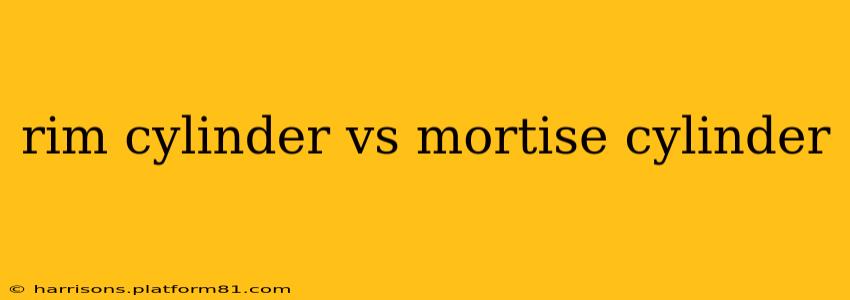Choosing the right lock cylinder can seem daunting, especially with the variety of options available. Two common types are rim cylinders and mortise cylinders. Understanding their differences is crucial for ensuring security and functionality. This comprehensive guide will break down the key distinctions between rim and mortise cylinders, helping you make the informed choice for your needs.
What is a Rim Cylinder?
A rim cylinder is a lock cylinder that's mounted directly onto the door's surface. It's a simpler, less intrusive installation, typically used on doors where a mortise lock isn't feasible or desired. The entire locking mechanism is external to the door itself. This makes them ideal for thinner doors or those without the space or structure for a mortise lock. They are often found on sheds, outbuildings, or interior doors where high security isn't a primary concern.
Advantages of Rim Cylinders:
- Easy Installation: Rim cylinders are relatively straightforward to install, often requiring minimal tools and expertise.
- Cost-Effective: Generally, rim cylinders are less expensive than mortise cylinders.
- Suitable for Thinner Doors: Their surface mounting makes them perfect for doors that lack the depth for a mortise lock.
Disadvantages of Rim Cylinders:
- Less Secure: Because they're mounted on the surface, rim cylinders are generally less secure than mortise cylinders, making them more vulnerable to forceful entry.
- Vulnerable to Weather: Exposed to the elements, they can be more susceptible to damage from rain, snow, or extreme temperatures.
- Limited Keyways: They often have fewer keyway options compared to mortise cylinders.
What is a Mortise Cylinder?
A mortise cylinder, also known as a mortise lock cylinder, sits inside a mortise (a cutout) in the door. This integrated design provides a more robust and secure locking mechanism. The cylinder is embedded within the door, offering superior protection against tampering and forced entry. Mortise cylinders are commonly used on exterior doors where enhanced security is essential.
Advantages of Mortise Cylinders:
- Enhanced Security: The recessed design makes them more resistant to forced entry and picking attempts.
- Durable Construction: Often constructed from more robust materials, they are built to withstand greater force.
- Wider Range of Keyways and Features: They offer a wider selection of keyways and additional security features like anti-picking mechanisms.
Disadvantages of Mortise Cylinders:
- Complex Installation: Installing a mortise cylinder requires more skill and precision due to the need for precise mortising of the door.
- Higher Cost: Typically more expensive than rim cylinders due to their more complex design and installation.
- Not Suitable for All Doors: Requires a door with sufficient thickness and a pre-cut mortise.
Rim Cylinder vs. Mortise Cylinder: Which One Should I Choose?
The best choice depends entirely on your specific needs and the context of the door.
- For exterior doors requiring high security: A mortise cylinder is the superior choice.
- For interior doors or doors where security is less critical: A rim cylinder might suffice.
- For thin doors or doors where installation must be simple: A rim cylinder is the more practical option.
- For doors needing a more aesthetically pleasing and integrated look: A mortise cylinder provides a cleaner, less obtrusive appearance.
What are the Different Types of Lock Cylinders?
This question broadens the scope beyond just rim and mortise cylinders to encompass other types, each with specific applications and security levels. While rim and mortise are the most common, other types include tubular locks, which are easily defeated and generally insecure, and deadbolt locks, providing additional security when combined with a regular door lock. Each type requires careful consideration based on its unique strengths and weaknesses.
How Do I Choose the Right Lock for My Door?
Choosing the right lock involves understanding the level of security required, the type of door, and the budget. Factors like the door's material, thickness, and location (interior or exterior) influence the type of lock best suited. Consulting with a qualified locksmith can provide expert advice based on your specific circumstances.
What is the Best Lock for Home Security?
There's no single "best" lock, as the optimal choice depends on individual needs. However, a robust multi-point locking system incorporating a mortise cylinder and a high-quality deadbolt is generally recommended for enhanced home security. Reinforcing the door frame and installing a visible security system can significantly improve overall protection.
This comparison of rim and mortise cylinders provides a solid foundation for making an informed decision. Remember to prioritize security, especially for exterior doors, and don't hesitate to consult with a professional locksmith for personalized advice.
